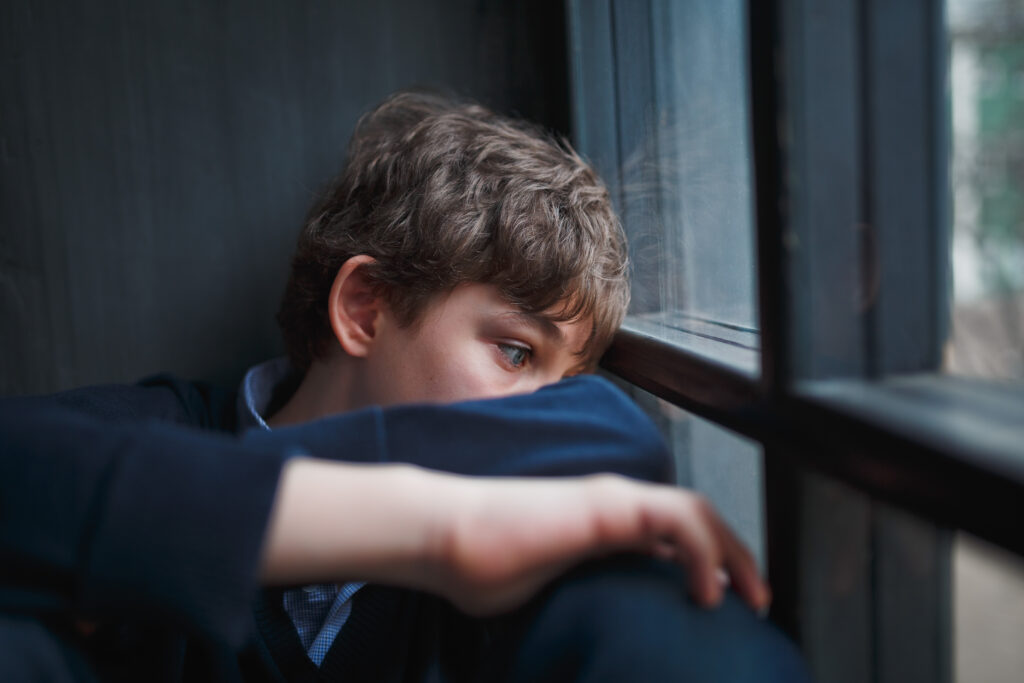How can I tell if my teen is struggling with their mental health?

There are so many things that our young people have on their mind these days; reasons why they might struggle with their mental health. But perhaps one of biggest stressors adolescents face is adolescence itself! Can you remember the rollercoaster of yours?
So much is going on for our young people from a developmental point of view during these formative years.
Of course, there are obvious changes in terms of physical development, the main one being the process of puberty – the development of secondary sex characteristics, starting periods for girls, growth spurts, changes in height, weight, and appearance. All of these impacting their body image and self-esteem.
And then psychological and cognitive development – the development of abstract thinking and advanced reasoning; exploring and figuring things out for themselves. The development of knowledge, skills, and problem solving, which helps the young person understand the world around them and make sense of where they fit in.
And of course, social development – the development of their personal identity and autonomy. Exploring and becoming comfortable with their sexuality. Forming important friendships and relationships and becoming independent from the family unit. And as part of this, experiencing intimacy and exploring sexual relationships for the first time. Recognition in their peer group becomes important – what others think about them. And part of their social development is also based around achievement, particularly educational achievement.
The good news is that most young people get through these changes and master any challenges without too many hitches. But if a young person is struggling with their mental health during this important time, then their development can be affected. This means that it is important to pick up the signs that they may be struggling and intervene early.
But reading teenagers is not always easy. It can be so hard trying to determine what is normal behaviour for an adolescent and when we should be worried.
To some extent, the unpredictable and sometimes erratic behaviour we see in young people may be explained by important changes going on in the adolescent brain.
The frontal lobe is the part of the brain that controls conscious decision making and impulse control. It allows us to empathise, make rational decisions and defer needs. But this region does not fully mature until we are in our mid-20s. This can explain why we sometimes see irrational decision making and impulsivity in adolescents.
In addition, the limbic system (the brain’s reward system) is highly active in adolescents. This means that they seek immediate gratification and pleasure satisfaction. Then, there is a lot of testosterone flying around – in both males and females. This blocks the amygdala – the region of the brain that helps us to avoid danger. This means again, we can see there is a neurobiological basis for risk-taking behaviour: young people have difficulty assessing the consequences of their behaviour and believe they are invincible.
So, with all these developmental brain changes, perhaps it could be argued the ‘unreasonable’ behaviour we may sometimes see in our young people cannot be helped!

But when does this ‘normal’ adolescent behaviour become abnormal? When should we worry?
It can be hard for adults to recognise when a young person needs support with their mental health. It can also be difficult for young people to speak up about the challenges they are facing. This is why it is important for anyone who spends time with adolescents to be on the lookout for some key symptoms and signs that may indicate they are struggling.
Just a note here: ‘signs’ in medical language are the things that we notice in other people, whereas symptoms are related to feelings a person has inside that we will not necessarily know about unless they choose to share these with us, or we ask them.
If we start with physical symptoms and signs to be alert to. If a young person is struggling with their mental health, their sleep can become affected. They may have trouble getting off to sleep, or perhaps wake up in the night and not be able to get back to sleep again. This can have the knock-on effect of making them feel tired the next day. They may complain about a loss of appetite, not seem interested in food, or may be showing unusual eating behaviours – starving themselves, over-eating, or perhaps making themselves sick. They may experience weight loss, or weight gain, as a result.
They may also experience changes in their feelings which they share with us. Feeling sad all the time; feeling hopeless – struggling to see the positives in life, or feeling worthless, even wishing they did not exist. Anxiety, irritability, or anger may be exhibited. Or a young person may feel numb – devoid of feelings altogether. In addition, we may notice mood swings with extreme highs, or extreme lows, of mood. We should all encourage the young people in our life to talk about their feelings with us.
Signs that their thinking (their cognition) is impacted include poor concentration and attention span. Perhaps these changes are things that are more likely to be noticed in school.
And the way a young person is thinking, and feeling may impact their behaviour. If a teen starts getting into arguments or fights, perhaps getting into trouble with the authorities, then this can be another indication that there is something else going on. If a studious pupil starts to drop off in terms of their performance at school, or even starts truanting, then again, these are behaviours that should prompt us to reach out.
There are also some important ‘red flags’ to be aware of: symptoms and signs that could indicate something serious is happening and that a young person needs specialist help from a healthcare professional. These include isolation and social withdrawal, severe anxiety that starts to impact the young person’s ability to function normally, persistent low mood or unhappiness, weight loss, restrictive eating, extreme aggression, substance misuse, self-harm or suicidal thoughts, distress about hearing or seeing things others do not hear or see, or expressing unusual or abnormal beliefs others do not share.
You know your child best. If you are worried or concerned, our message is to trust your instincts. Be on the lookout for changes and reach out and talk to them to explore things further. Remember, when a young person is struggling with their mental health, they often find it hard to ask for help. We can take the first step here, and work together with them to get them the help they might need.
By Dr Michelle Wright and Dr Mecky McNeil from HealthFirst
HealthFirst offers physical and mental health training and education to schools, companies, and individuals across Switzerland. Visit www.healthfirst.ch to find out more.
